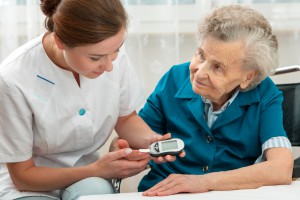Share This
Related Posts
Tags
William Sansum Diabetes Center
By Erica Rascón on Jul 7, 2016 in Giving, People
Yardi is a proud supporter of William Sansum Diabetes Center, an organization that is dedicated to the prevention, treatment and cure of diabetes through research, education and care. As a follow-up to our leading article, we caught up with Wendy Bevier, PhD, for the latest developments at the organization.
Dr. Bevier began working with the organization in 1990, focusing on studies involving women with gestational diabetes. Since then, her main focus has been the Artificial Pancreas (AP), with additional research in the immunotherapy of diabetes with the non-obese diabetic mouse.
The artificial pancreas is used for clients with type 1 diabetes who do not produce insulin. The artificial organ offers clients an insulin pump that delivers insulin, a continuous glucose monitor that measures blood glucose every five minutes, and a “brain” on a phone that controls them. When we checked in with Sansum Diabetes three years ago, AP was in early stages of clinical trials. Now, it is in the next phase, meaning that it has “gone home.”
“Subjects can take the devices and system home with them and they are monitored remotely 24/7,” explains Dr. Bevier. “The technology is not approved commercially, but several groups are working on this research.”
Once approved by the FDA, AP could be available for mass production in the near future. There are several steps to take between now and then. The AP is constantly being improved and refined based upon the trials and feedback from users.
Sansum Diabetes also works to broaden the AP applications. The next phase of the study explores AP in pediatric and elderly patients. These developments are a collaboration with the National Institutes of Health and coordinated by the Jaeb Center.
In addition to their work with the artificial pancreas, Sansum Diabetes has initiated several new studies, many focusing on glucose monitoring. “Among [the studies] is a new tool for measuring blood glucose, as well as a study to improve the accuracy of existing continuous glucose monitors using improved sensors. WSDC is collaborating with partners to develop new blood glucose lowering drugs,” says Dr. Bevier.
To supplement its research behind the scenes, the organization has expanded its public programming. Below are a few popular new programs:
ONETALK is a support group for people with type 1 diabetes and for parents of children with type 1. The group represents a joint effort between Sansum Diabetes and Juvenile Diabetes Research Foundation. The group meets monthly at CenCal Health. Sessions alternate between Sharing & Caring and engaging presentations by guest speakers.
Jordan Pinsker, MD, recently joined the Sansum Diabetes. He offers Pediatric Diabetes Clinic Services for children and adolescents. Dr. Pinsker focuses on the use of advanced technologies to assist children and their families with diabetes care. His consultations offer guidance on insulin pump use, continuous glucose monitors, and budding technologies.
GuiltFreeSB takes the guesswork out of healthy eating for people living with diabetes of all ages. A grant from the Mosher Foundation has created a program whose mission is to “make Santa Barbara the world’s most diabetes-friendly destination.” The program aims to serve the 550,000 residents and visitors who come to Santa Barbara with conscious eating habits in tow.
Registered dieticians work with locally-owned restaurants and retailers to create menu options that are delicious, nutritious, and balanced. While diners with diabetes are the focus, anyone can enjoy the custom-crafted meals to improve their overall health.
To learn more about William Sansum Diabetes Center research and public outreach, please visit sansum.org.
